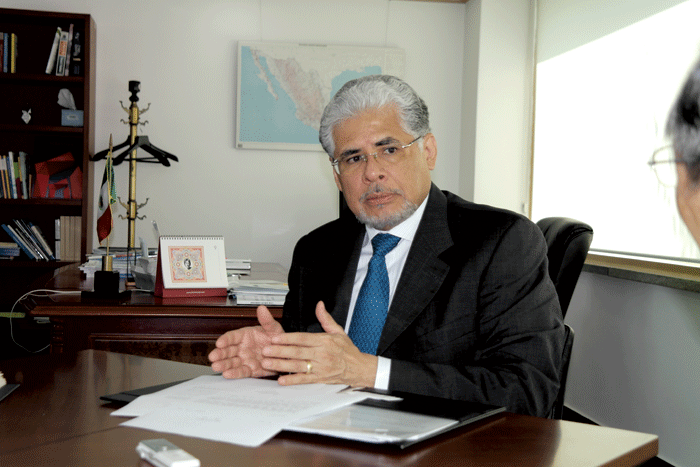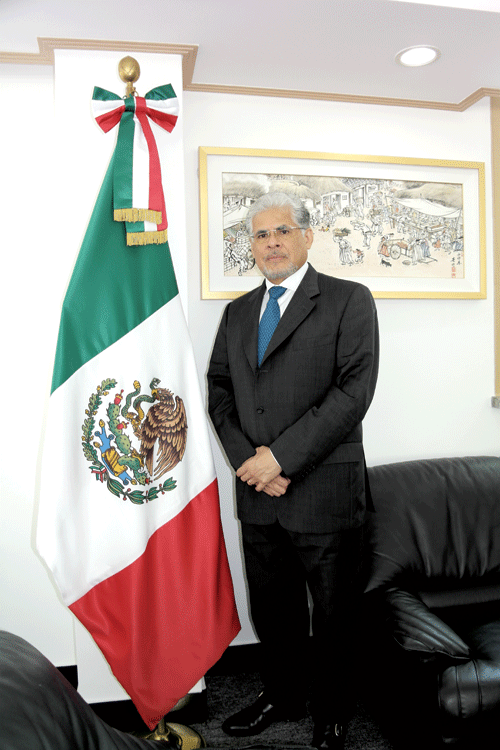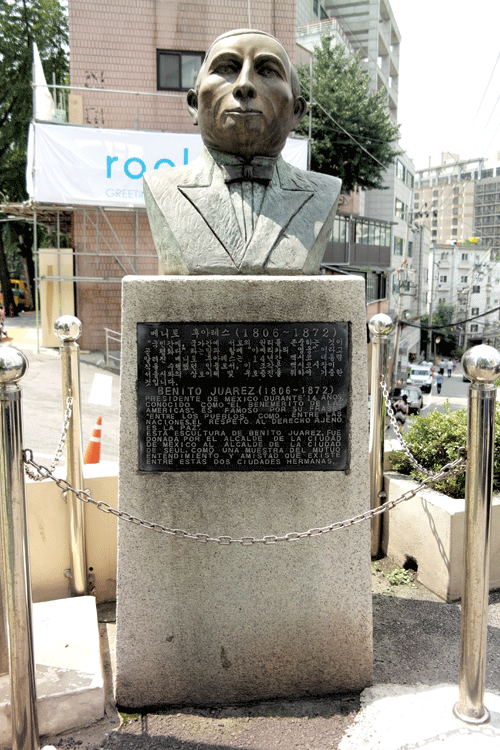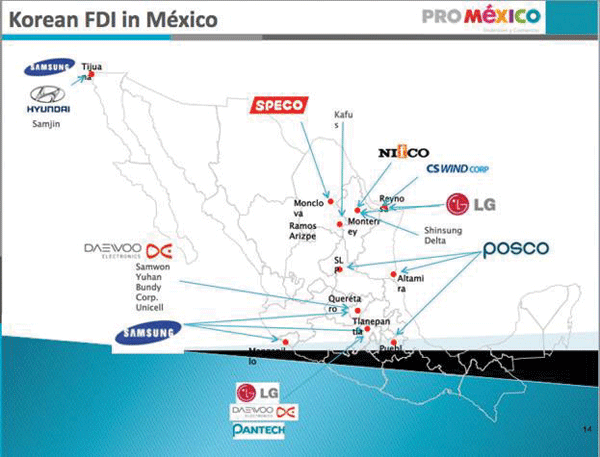MEXICO
Interview with Ambassador Jose Luis Bernal Rodriguez of Mexico in Seoul
Korea is the sixth largest partner of
Mexico in the world
The following are details of an interview which The Korea Post had with newly accredited Ambassador Jose Luis Bernal Rodriguez of Mexico in Seoul on Aug. 12, 2013.--Ed.

Question: What are your views on the relationship between Korea and Mexico and its outlook. What are the differences between your knowledge of Korea before and after your actual arrival?
Answer: Korea is Mexico’s 6th largest partner in the world. Bilateral trade is above 16 billion USD. Over 1,500 Korean companies have investments in Mexico. Tourism has expanded remarkably. Educational exchanges are expanding. Mexico and Korea are active partners in cooperation and political dialogue, both in bilateral and multilateral arenas. Since 2005 both countries have a strategic partnership. As emerging economies both countries share many similarities and common challenges.
Q: Do you have any specific plans to further expand the range of cooperation and Exchange between Korea and Mexico?
A: First of all, we want to promote Mexico following a comprehensive approach, I mean, presenting to our Korean friends and partners the many advantages of Mexico as a big Nation with a huge heritage and strong culture, a reliable partner for trade, investment, technological development and academic exchanges, a wonderful touristic destination, and an emerging economy that is a responsible actor in international affairs.
To take full advantage of the potential of our bilateral relations, we are defining the priority sectors in which to promote additional trade and investments, so as to target specific projects involving technical, scientific and technological cooperation too. Political dialogue will be strengthened, not only in relation to bilateral matters but also, increasingly, looking at working together on the global agenda.
Of course, we want to make sure that our respective national leaders interact as often as possible as part of our intention to bring our strategic alliance to higher levels. Therefore, we will pay special attention to arrange for new bilateral meetings in the next few months. At the same time, the Embassy will continue giving the necessary support to further develop contacts among members of the respective parliaments, local governments and judicial authorities, among others.

A: The government of President Enrique Pena Nieto is taking decisive action to address the challenges in the areas of public safety, strengthening the rule of law and governance, fight against poverty, educational reform and employment, programs to expand the infrastructure, housing, communications, tourism and development of industrial zones.
There have also been new agreements to achieve consensus among different political parties, namely the Pact for Mexico. Since the beginning of the mandate of President Pena Nieto, the government and the main political forces met to endorse our commitment to the transformation of the country. The Pact is a broad-range national agreement to improve the quality of life of Mexicans, beyond ideology or party interests. It has certainly been an extraordinary, far-reaching democratic exercise, favoring the interests of the nation.
A dynamic presence in the world, according to our relevance to the purposes and goals of development and cooperation agreements.
Regarding the foreign policy of Mexico’s current administration, President Pena Nieto has outlined four pillars Mexico will adopt in the coming years: strengthen Mexico’s international presence; expand and enhance international cooperation; promote the value of Mexico in the world and protect Mexico’s interests abroad. Under his government, Mexico will assume its global responsibility to contribute to the solutions to the major challenges facing humanity.
President Pena Nieto has declared the Mexican government’s commitment to strengthening relations and achieving a greater presence in the Asia-Pacific region. Mexico regards the Asia-Pacific region as an opportunity to expand trade links, mutual investment and academic exchanges, as well as cooperation on international issues of mutual interest, such as poverty reduction, job creation and combating climate change.
Q: What are the major tourist destinations of your country? Are Korean visitors increasing?
A: Mexico seeks to become a world class tourist destination. Mexico receives over 23 million tourists each year. Worldwide, Mexico ranks first in terms of archaeological sites, with more than 30 thousand, and 110 thousand historical monuments.
Mexico offers unique experiences. A three thousand-year history, the rich culture, the gastronomic variety and biodiversity constitute a highly differentiated tourism product offering.
A wide variety of beach resorts, archaeological, colonial cities, museums and cultural centers, mountain tourism, deserts, ecotourism, fishing, family holidays and groups, await Korean visitors in: Chichen Itza, Tulum, Tajin, Teotihuacan, Monte Alban; Mexico City, Queretaro, San Miguel de Allende, Guanajuato, Puebla, Morelia and Oaxaca; Cancun and the Riviera Maya, Acapulco, Puerto Vallarta, Veracruz, Campeche, Mazatlan, Ensenada and Los Cabos, among many other places.
In February 2013, President Pena Nieto presented the National Tourism Policy, which aims to make a more efficient, sustainable and competitive tourism industry. It is based on four pillars:
1. Spatial and Sectorial Transformation, intersectorial agenda, promote comprehensive, coordinated by the Ministry of Tourism.
2. Innovation and Competitiveness, to diversify and consolidate existing destinations.
3. Development and Promotion. The state will strengthen its influence in the planning, development and promotion of tourist destinations, as a leader of the national strategy and facilitating private efforts.
4. Sustainability and Social Benefit. For Mexico, tourism is a clean industry, an industry that great care and preserve our natural heritage, history and culture.
Korea is among the major Asian markets of tourism to Mexico.
In 2012 the number of Korean travelers to Mexico was of 47, 615 people, 36.2% more than in 2010. In the first four months of 2013 the number reached 18,289, up 20% from the same period in 2012.
The destinations receiving larger numbers of Korean visitors are Cancun, Mexico City, Monterrey, Guadalajara and Los Cabos.
In 2013, Mexico's goal is to increase the number of Korean travelers to 65,000.
To do this, we will be present in the major tourism fairs in Seoul and Busan. In September Mexico will participate in Busan International Travel Fair.
In the second half of 2013 we will hold at least 3 training seminars focused on Korean tourism industry.
In July 2012, Mexico and Korea signed a memorandum of understanding to strengthen cooperation in the tourism sector, the diversification of markets, increase the flow of visitors, mainly involving the medical, culinary, luxury, adventure and nature and sports tourism, sun and beach and cultural tourism.

Q: What was the volume of the bilateral trade last year? What is the outlook for this year and what are the most promising areas of investment by Korean companies in your country and vice versa?A: In 2012, total trade reached 15 billion USD. Mexican exports were around 2 billion USD, and Mexico imported Korean products worth 13 billion dollars.
The main products exported by Mexico to Korea in 2012 were: lead (30.2%), zinc (16.4%), cast iron and steel (10%), passenger cars (4.8%), and silver (4.5%).
The main products imported from Korea in 2012 were: parts for television and radio (20.6%), integrated circuits (13.4%), passenger cars (5.9%), machinery and parts for manufacturing (5.3%) and auto parts (3.9%).
In the period between 1999 and 2012, foreign direct investment from Korea officially recorded was 1,297 million dollars.
Q: Who are the small-medium Korean business companies, as well as the big ones actively engaged in business and economic cooperation with your country? Introducing them by the Korea Post, especially how they benefit from your esteemed country would encourage other Korean companies, big and small, to also want to enter your country for investment and/or import/export activities.
A: See map below.
Q: What additional information about Mexico would you want to add?
A: Mexico ranks 11th in the world for its territory and population:
- Population: 118 million people
- Territory: 2 million square kilometers.
- Mexico has the largest number of Spanish-speaking people in the world
Mexico is 13 to 14 largest economy in the world by GDP (followed by Korea)
- Total GDP: 1.4 million of millions USD.
- GDP per capita: $ 10,000.00 USD.
Foreign trade:
- Number 10 in imports and exports (742 billion USD in 2012)
- Second U.S. trade partner in the world
- The largest exporting country in Latin America.
- Openness to trade and investment have been crucial in this process. In fact, Mexico has
signed preferential agreements with 44 countries.

Investment:
6th recipient of FDI among emerging economies.
Today, Mexico is part of the G20, OECD, NAFTA, an important partner of all countries in Latin America, has a Strategic Partnership with the European Union, is a member of APEC since 1994 and is looking increasingly new partnerships with countries of the Pacific Rim, including the Pacific Alliance in Latin America (Chile, Colombia and Peru) and new complementation agreements with this region of Asia.
This transformation is the result of the structural reforms of the past 30 years, in terms of economic openness, free trade, enhancing competitiveness, improving infrastructure, education and training, along with sound economic policies and good financial management public debt, all of which have contributed to growth, job creation and poverty alleviation.
About Ambassador Jose Luis Bernal Rodriguez:
Ambassador Jose Luis Bernal is a career member of Mexico’s Foreign Service since May 1st, 1980. He holds ample experience on several areas of Mexico’s foreign policy.
Holding the rank of Ambassador since December 1995, Jose Luis Bernal has served as:
1. Ambassador in the Republic of Korea, since July 16, 2013. Serves concurrently before the DPRK and Mongolia.
2. Ambassador in the Czech Republic, from August 2007 to July 15, 2013
3. Ambassador in Switzerland -- serving concurrently before the Principality of Liechtenstein - from January 2002 to July 2007.
4. Mexico’s Senior Official (SOM) to the Asian Pacific Economic Cooperation Forum (APEC), 2001
5. Chief Economic Advisor, Ministry of Foreign Affairs, 2001
6. Consul General of Mexico in Los Angeles, California, 1999-2001
- Mexico’s Deputy Permanent Representative before the Organization for Economic Development and Cooperation (OECD), in Paris, 1996-1999.
- Vice Chair of the OECD’s Committee on Territorial Development Policies, 1999-2001
Before being appointed as Ambassador, Mr. Bernal held the following responsibilities:
- Minister, Embassy of Mexico in Washington, D.C., in charge of coordinating relations with the U.S. Congress during the negotiations of the North American Free Trade Agreement (NAFTA), 1991-1993.
- Counselor and First Secretary for Economic Affairs, Embassy of Mexico in Washington, D.C., 1985-1991
- Director General of the Foreign Service and Personnel, Ministry of Foreign Affairs. 1995-1996.
- Director General for Multilateral Economic Relations and Economic Relations with North America 1993-1995,
- Deputy Director General for Bilateral Economic Relations (1981--1985),
- Chief of the Department for Economic Affairs in the North American Desk (1979--1981),
Before joining the Ministry of Foreign Affairs, he was an International Financial Analyst at the Ministry of Finance, and an External Advisor for International Economic Cooperation at the Ministry of Commerce, 1979.
Mr. Bernal has represented Mexico in numerous bilateral and multilateral negotiations, and in meetings of the United Nations, the Economic Commission for Latin America and the Caribbean; the World Trade Organization, APEC, the OECD, the World Economic Forum, the Crans Montana Forum, and many other institutions.
Educational background: Jose Luis Bernal holds a Bachelor’s degree on International Relations, Summa Cum Laudae, from the National Autonomous University of Mexico, and a Master’s Degree on Economics from CIDE, the Center for Teaching and Research on Economics in Mexico. He has followed courses on Public Relations, International Security and Development Cooperation.
Languages: Spanish, native; fluent in English and French, basic knowledge of German and Italian.
Academic experience: Mr. Bernal has been a Professor at the School for Political and Social Sciences in the National University of Mexico and at the Technological University in Mexico City. He has been associated to the University of California at Los Angeles (UCLA) Faculty of Public Policies and was member of the Board of UCLA’s Program on Mexico. He has been a guest scholar at both the Anglo American University of Prague and the University of Economics of Prague.
Publications: Jose Luis Bernal has published extensively on matters related to the Mexican economy, Mexico-USA economic relations, the North American Free Trade Agreement, Latin American matters, social development, and on economic diplomacy.
Decorations and awards: France’s National Order of Merit, in the rank of Chevalier, 1986. Recognition by Mexico´s Foreign Ministry, for 25 years of uninterrupted service, 2005.
Personal information: Born in Mexicali, Baja California, Mexico, on March 20, 1956.
Married to Mrs. Bertha Alicia Garcia-Rangel; they have two children: Jennifer (25) and Christopher (21). k

